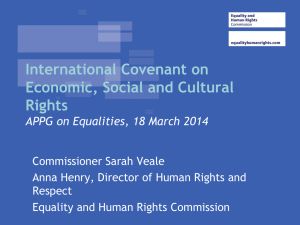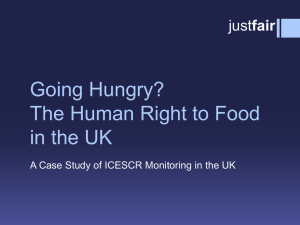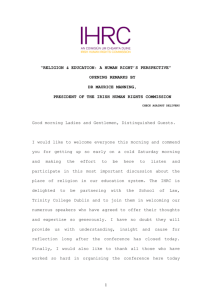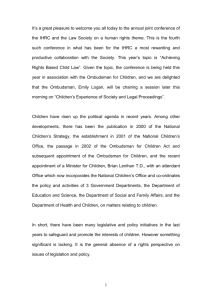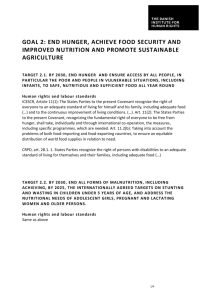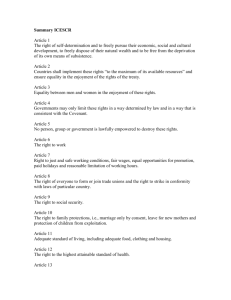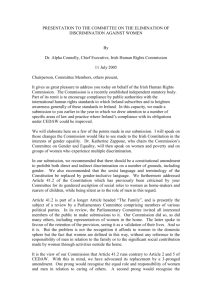International Covenant on Economic Social and Culture Rights
advertisement
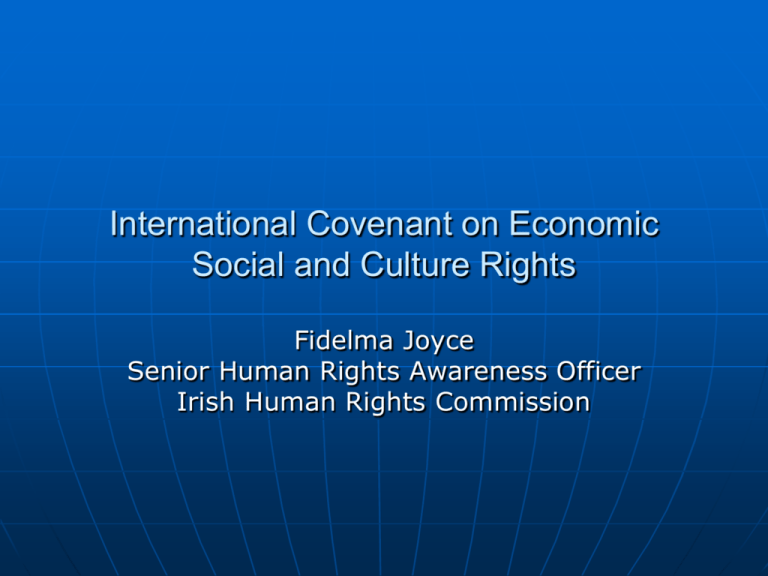
International Covenant on Economic Social and Culture Rights Fidelma Joyce Senior Human Rights Awareness Officer Irish Human Rights Commission Format Introduction to IHRC Introduction to ESCR International Covenant on Economic Social and Cultural Rights Ireland and ICESCR 2002 Concluding Comments CEDAW Concluding Comments 3rd Report IHRC and ICESCR Next Steps Irish Human Rights Commission Established under statute in 2001 to promote and protect human rights in Ireland Functions of relevance to ICESCR • To keep law and practice under review • To consult with national and international bodies • To promote awareness of human rights Irish Human Rights Commission Strategic Plan 2007-2011 6 strategic goals • Promote a culture of respect for human rights • Promote centrality of human rights in formulation of policy, legislation and practice • Work jiuntly with Northern Ireland Human Rights Commission • Promote a society that values inclusiveness and diversity • Assess and anticipate emerging challenges • Strengthen organisational capacity IHRC and Treaty Monitoring Paris Principles • Independence, Powers and Functions • Functions include: • “To contribute to the reports which the Staes are required to submit..and where necessary, to express an opinion on the subject, with due respect for their independence • Encourage ratification of treaties and co-operation with UN Bodies What are economic, social, and cultural rights Social Rights • Core needs for a dignified life Economic Rights • • • • Right to an Adequate Standard of Living Rights to work Right to social assistance Right to property Pre-conditions for enjoyment of social and other rights Cultural Rights • Right to education • Right to participate in one’ own culture • Right to cultural identity ICESCR - International Covenant on Economic Social and Cultural Rights Universal Declaration of Human Rights 1948 (2008 - 60th Anniversary) • Statement of ideals to underpin a legal text Divisions and ‘Cold War’ led to preparation of two separate convenants • ICCPR – International Covenant on Civil and Political Rights • ICESCR – International Covenant on Economic, Social and Cultural Rights • States unwilling to accept legal obligations in relation to economic, social and cultural rights ICESCR - International Covenant on Economic Social and Cultural Rights Right to self-determination Equal rights between men and women Right to work Right to just and favourable conditions of work Right of workers to organise and bargain collectively Right to social security and social insurance Right to protection and assistance for the family Right to an adequate standard of living • Adequate food • Adequate clothing • Adequate housing Right to freedom from hunger Right to the highest attainable standard of physical and mental health, including health care Right to education Right to culture and benefit from scientific progress ICESCR - International Covenant on Economic Social and Cultural Rights 1993 Vienna Declaration • Indivisibility, interdependence and inter-relatedness of rights endorsed • Poverty and social exclusion constituted a violation of human dignity Limburg Principles • Immediate Obligations to respect, protect and fulfill UN Committee on ICESCR • Monitors compliance of signatory States with the human rights standards set out in the covenant • Prepares General Comments to give more substance to the articles outlined in the ICESCR Ireland and ICESCR ICESCR was opened for signature and ratification in 1966 Ireland • • • • Signed 1 October 1973 Ratified 8 Dec 1989 1st report submitted in 1997 UN Committee on CESCR Concluding Observations in 1999 • 2nd report submitted in 2001 • UN Committee on CESCR Concluding Observations in 2002 • 3rd report to be submitted in Dec/Jan 2008 2002 Concluding Observations Positives Revised Social Charter CERD IHRC established Domestic violence legislation Min. wage NAPS - - - - Concerns ICESCR not incorporated or reflected in Irish law IHRC not operational Disability Bill not human rights based approach (HRBA) Discrimination against people with physical and mental disabilities Article 40.1 of Constitution on equality before the law and principle of non-discrmination in a.2 and a.3 of ICESCR Trade unions and collective bargaining Human rights not integral toNAPS Affordable housing People with mental disabilities lack of access to independent living Human rights frame-work missing from National Health Strategy 2002 Concluding Observations Recommendations • Economic, social and cultural rights are justiciable and should be given full effect in the domestic legal order • State report on initiatives by the IHRC to promote economic, social and cultural rights • Adoption of HRBA in Disability Bill • Thorough review of sheltered workshops • Amending article 40.1 of the Constitution on equality before the law • Review methods of fixing min. wage • Protect trade union’s collective bargaining • Measures taken by Ireland on domestic violence Concluding Comments Recommendations • Combat Poverty Agency should be well resourced • Integrate human rights into NAPS • Accelerate social housing programme • Adequate information on extent of provision of adequate accommodation to Traveller families • People without serious psychiatric illness more appropriate care settings • Human rights framework for National Health Strategy • Constitutional amendment on extending primary education access to all adults with special needs • International Co-operation contribution CEDAW Concluding Observations Compare the concluding comments of the UN Committee on ICESCR and the concluding comments of the UN Committee on CEDAW CEDAW Concerns • Recognised groups of women in vulnerable situations • Barriers in access to education, employment, healthcare and other services • Closer monitoring of women’s poverty and social exclusion • Gender impact of all social and economic policies required CEDAW Concluding Comments CEDAW Recommendations Substantive equality between men and women should be recognised in the Irish Constitution Resources for roll-out of National Women’s Strategy should be available Provision of affordable childcare Strong action to eradicate pay discrimination De facto Equal opportunities in the labour market Wide consultation when preparing next report 3rd Report by Ireland Irish government has draft its 3rd report Draft report is currently being circulate to departments for their final comments Expect draft to be circulated to wider statutory, and community and voluntary sector in early November • Contact Tara.Murphy@dfa.ie to get on circulation list 4-6 weeks time frame to offer feedback Final State report should be submitted we anticipate in January 2008 Anticipate that UN Committee will hear Ireland’s report towards end of 2008 (no date confirmed yet) IHRC and ICESCR IHRC will: Comment on Irish government’s report Consult with NGOs and other bodies Submit its own report in advance to the UN Committee as it has done on CERD, CEDAW, CRC, and in early 2008 on the ICCPR. Will have informal contact with Committee members and Secretariat Special part of the pre-sessional hearing for National Human Rights Institutions (NHRIs) like the IHRC Epilogue…work of the IHRC on economic, social and cultural rights Conference December 2005 Discussion Paper ‘Making Economic, Social and Cultural Rights Effective’ 1st Enquiry Report on ‘Self-Employed and the Old Age Contributory Pension’ Housing Rights Project with Equality Authority Proposed submission to UN Committee on the ICECSR www.ihrc.ie Publications Next Steps ……………………..
